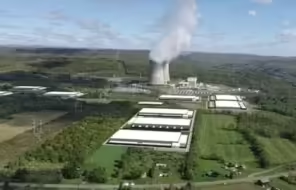Pushing the fusion industry forward is all about public-private partnerships. At least, that’s the high-level takeaway from a meeting of UK and US fusion leaders yesterday in Washington, DC.
At a roundtable hosted by Tokamak Energy, members of the UK and US fusion industries and regulatory worlds met to talk about the budding partnership, where it matters most, and how it’s expected to develop.
“We’re very determined to be building a very strong ecosystem of partners around us,” Tokamak Energy CEO Warrick Matthews said. “That’s what we have to do to develop and deliver fusion.”
A bit of backstory: The UK and US are feeling out their new relationship in fusion. In November, the DOE and the UK’s Department for Energy Security and Net Zero formed a strategic partnership to develop fusion energy, pooling resources across academia and industry.
Independently, there are fusion-funding mechanisms on either side of the pond:
- The UK has its Spherical Tokamak for Energy Production (STEP) program, which is working with industry to develop a plan for a future fusion facility.
- The US has a milestone-based fusion energy program that awarded $46M to eight companies last year to further their concepts.
- Both nations have formal strategies for advancing fusion technology domestically.
Now, the old allies are looking for new places to partner on fusion development. The US aims to “be a catalyst in any way that we can” for the growing fusion sector, per Rep. Don Beyer (D-VA), co-chair of the 100+ member fusion energy caucus.
“We will keep pushing for appropriate government investments in fusion,” Beyer said.
Better together: The resounding consensus among the group of government officials and industry leaders was that to develop fusion tech, public and private groups need to work together beyond just funding.
JP Allain, DOE assistant director of fusion energy, said the US wants to “learn from the past” in successfully advancing new and mission-critical tech. Government and industry collaboration, he said, “better aligns our direction towards a single vector.”
Standing alone: The reasons to work together on developing fusion aren’t all warm and fuzzy. Energy independence and security are big parts of it.
“As we seek to also end the 75 years that we’ve had in our economies of dependency on carbon in our economies, and frankly, on the Gulf for its oil and elsewhere for its gas, we need to make sure that we don’t just swap that for a new dependency on rare earths,” said James Roscoe, the UK’s deputy head of mission in Washington.
Domestically developed and fueled fusion, if done right, could ease that historic dependence.
Down the pike: Before the allies can achieve the holy grail of energy independence, they need to develop the upstream resources and supply chain needed for a sustainable fusion industry. There isn’t a developed pipeline for tritium production, a key fuel for many fusion concepts. The UK’s STEP program seeks to address that problem, Roscoe said, before handing it off to industry.
“The US and the UK will need to prioritize that initial startup,” Matthews said. “Then it’s on the fusion companies to generate the surplus.”
Lead Reporter of Ignition





